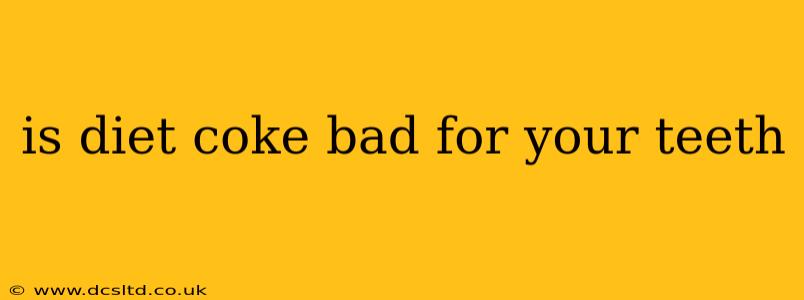Is Diet Coke Bad for Your Teeth? A Comprehensive Look at the Effects of Diet Soda
Diet Coke, and diet sodas in general, are marketed as healthier alternatives to their sugary counterparts. However, the question remains: are they truly better for your teeth? The short answer is: it's complicated. While they lack the sugar that fuels cavities, other ingredients can still negatively impact your oral health. This article will delve into the specifics, addressing common concerns and providing you with the information you need to make informed choices.
Does Diet Coke Cause Cavities?
This is a key question many people ask. Unlike regular Coke, Diet Coke doesn't contain sugar, the primary culprit behind tooth decay. Bacteria in your mouth feed on sugar, producing acids that erode tooth enamel, leading to cavities. Since Diet Coke is sugar-free, it doesn't directly contribute to this process in the same way.
However, the absence of sugar doesn't give Diet Coke a clean bill of health.
What are the other ingredients in Diet Coke that can affect my teeth?
Diet Coke's acidity is a significant concern. The phosphoric acid in Diet Coke is highly acidic, and this low pH can erode tooth enamel over time, making teeth more susceptible to cavities and other dental problems. The frequent consumption of acidic drinks, even without sugar, can weaken enamel, leading to increased sensitivity and potential discoloration.
Does the artificial sweetener in Diet Coke affect my teeth?
The artificial sweeteners used in diet sodas, such as aspartame, acesulfame potassium, and sucralose, are generally considered safe for consumption. However, research on their long-term effects on teeth is still ongoing, and some studies suggest potential indirect links to oral health issues. More research is needed to definitively confirm or refute these claims. But the primary concern with diet sodas remains their acidity, not the artificial sweeteners themselves.
How does Diet Coke affect enamel erosion?
The acidity of Diet Coke directly attacks the enamel. Think of it like a slow, constant etching. Regular consumption weakens the enamel, making teeth more vulnerable to staining and cavities. The erosion isn't immediate, but the cumulative effect over time is substantial.
How can I minimize the negative effects of Diet Coke on my teeth?
If you enjoy Diet Coke, moderation is key. Limit your consumption and try to avoid swishing it around your mouth. Rinsing your mouth with water after consuming Diet Coke helps neutralize the acid and wash away the residue. Maintaining excellent oral hygiene—brushing and flossing twice daily—is crucial to combat the effects of acidity. Consider using a fluoride mouthwash to help strengthen your enamel.
Are there healthier alternatives to Diet Coke?
Yes, absolutely! Water is always the best option. Unsweetened tea and coffee are also better choices. If you need a bit of fizz, consider sparkling water with a squeeze of citrus. These alternatives provide hydration without the harmful effects of acidity.
What should I do if I'm concerned about the effects of Diet Coke on my teeth?
If you're worried about the impact of Diet Coke or any acidic beverage on your teeth, schedule a checkup with your dentist. They can assess the condition of your enamel and advise on ways to mitigate any damage.
In conclusion, while Diet Coke lacks sugar, its high acidity presents a significant risk to your teeth. Moderation, proper oral hygiene, and mindful consumption are essential to minimize the potential negative effects. Choosing healthier alternatives is always the best way to protect your smile.
